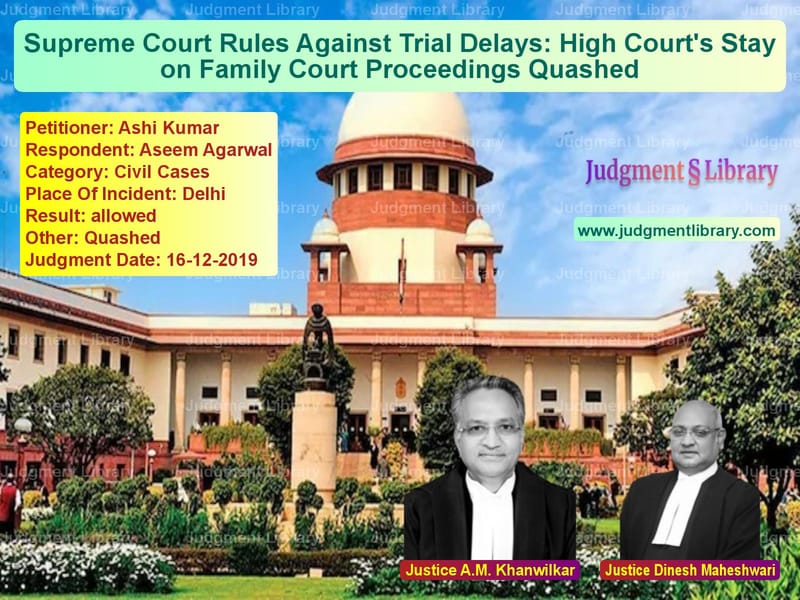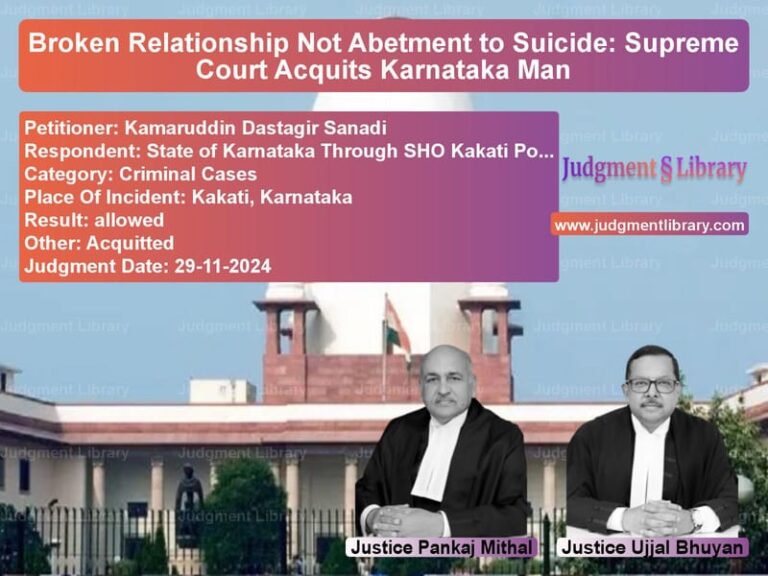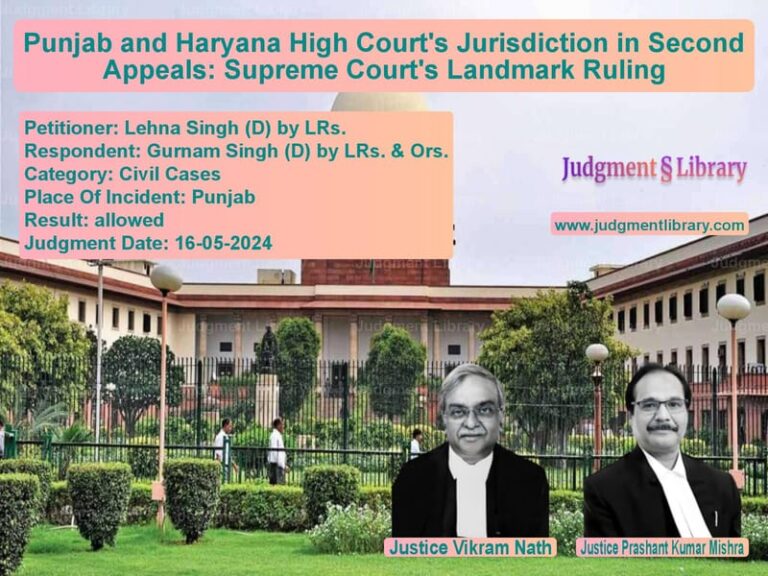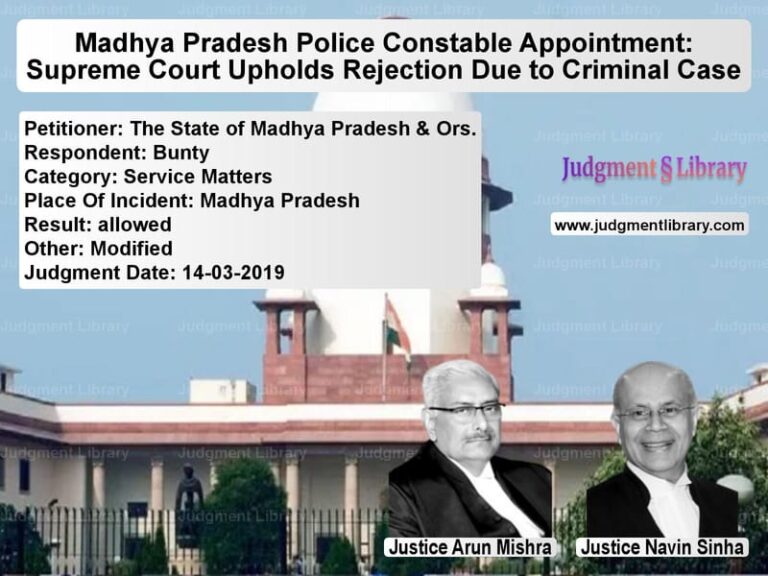Supreme Court Rules Against Trial Delays: High Court’s Stay on Family Court Proceedings Quashed
The case of Ashi Kumar v. Aseem Agarwal is a significant ruling that underscores the importance of procedural fairness in family law cases and the need for courts to prevent undue delays in trials. The Supreme Court, in its judgment dated December 16, 2019, overturned the Delhi High Court’s stay order on an ongoing family court trial and reaffirmed that legal undertakings given before a court must be honored.
This judgment highlights the necessity for compliance with court directions, especially in sensitive family disputes. The Court held that a litigant cannot unilaterally refuse to comply with an order and then seek relief from a higher court without first approaching the original court for modification. This case sets a crucial precedent in ensuring that trials proceed without unnecessary interference, particularly in family law matters where prolonged litigation can cause emotional and financial strain on the parties involved.
Background of the Case
The dispute originated from a case pending since 2011 before the Family Court, Patiala House, Delhi. The respondent, Aseem Agarwal, was directed to produce specific documents related to a divorce case in New Zealand. The Family Court had ordered him to submit the original divorce petition and judgment from the Family Court in Auckland, New Zealand.
Despite multiple opportunities and an explicit undertaking given before the Family Court that he would produce the documents, the respondent failed to comply. Instead, he filed a writ petition before the Delhi High Court challenging the order, which led to a stay of the trial. This stay resulted in further delays in the proceedings, which had already been pending for nearly a decade.
Petitioner’s Arguments
Ashi Kumar, the petitioner, challenged the High Court’s decision on several grounds:
- The respondent had voluntarily given an undertaking before the Family Court to produce the documents but failed to do so.
- By filing a writ petition instead of complying with the order or seeking relief from the Family Court, the respondent violated due process.
- The High Court’s intervention resulted in an unnecessary delay in the trial, which was already prolonged beyond a reasonable period.
- The Family Court had acted within its jurisdiction in directing the respondent to produce the documents.
- The respondent’s failure to comply with his legal commitment amounted to contempt of court.
Respondent’s Arguments
The respondent, Aseem Agarwal, defended his decision to approach the High Court with the following arguments:
- The documents requested by the Family Court were not relevant to the ongoing dispute.
- He faced logistical difficulties in obtaining the required documents from New Zealand.
- The High Court was justified in intervening to prevent irrelevant material from being introduced into the trial.
- The order requiring him to produce the documents imposed an undue burden on him.
Supreme Court’s Analysis
The Supreme Court conducted a thorough review of the procedural history of the case and found multiple irregularities in the High Court’s intervention:
- The respondent had given an undertaking before the Family Court to produce the documents but did not honor it.
- The High Court’s stay order was issued without considering the respondent’s previous commitments.
- The proper course of action for the respondent should have been to approach the Family Court for relief rather than seeking a writ petition.
- The undue delay in compliance with court orders obstructed the fair administration of justice.
The Supreme Court emphasized:
“The respondent having given an undertaking to the Family Court was obliged to comply with the same unless absolved therefrom by the Family Court.”
Furthermore, the Court noted that procedural fairness demands that litigants respect the hierarchy of courts and not seek unnecessary interventions that delay justice. The respondent’s conduct, in this case, amounted to an abuse of the legal process.
Key Legal Precedents Cited
The Supreme Court cited several landmark rulings to reinforce its position:
- Salem Advocate Bar Association v. Union of India – Emphasizing the need for timely disposal of family disputes.
- K.K. Velusamy v. N. Palanisamy – Holding that procedural delays should not be used as a tactic to avoid compliance with court orders.
- State of Uttar Pradesh v. Anil Kumar – Establishing that undertakings given before a court must be honored.
Final Judgment
The Supreme Court ruled in favor of the petitioner and set aside the High Court’s stay order. The Court held:
“The High Court erred in interfering with the Family Court’s order. The stay granted on the trial is set aside, and the respondent is directed to either comply with the order or seek relief from the Family Court.”
The Supreme Court further directed:
- The Family Court proceedings must continue without further delay.
- The respondent may apply for additional time to produce the documents, but such a request must be made before the Family Court.
- The production of documents by the respondent does not prevent him from arguing their relevance before the Family Court.
Impact of the Judgment
This ruling has far-reaching consequences for family law proceedings and procedural fairness:
- It upholds the authority of Family Courts to enforce compliance with their orders.
- It discourages unnecessary interventions by higher courts in ongoing family disputes.
- It reinforces the principle that court undertakings must be respected and complied with.
- It ensures that family law proceedings are not subjected to indefinite delays.
- It provides clarity on the proper legal process for seeking relief from court orders.
Conclusion
The Supreme Court’s decision in Ashi Kumar v. Aseem Agarwal underscores the importance of respecting court procedures and ensuring that trials are conducted efficiently. The ruling reaffirms that litigants cannot seek unnecessary stays on trials without first exhausting remedies before the lower courts. By quashing the High Court’s stay order, the Supreme Court has sent a strong message that procedural fairness and compliance with court orders are paramount in family law cases.
Petitioner Name: Ashi Kumar.Respondent Name: Aseem Agarwal.Judgment By: Justice A.M. Khanwilkar, Justice Dinesh Maheshwari.Place Of Incident: Delhi.Judgment Date: 16-12-2019.
Don’t miss out on the full details! Download the complete judgment in PDF format below and gain valuable insights instantly!
Download Judgment: Ashi Kumar vs Aseem Agarwal Supreme Court of India Judgment Dated 16-12-2019.pdf
Direct Downlaod Judgment: Direct downlaod this Judgment
See all petitions in Legal Malpractice
See all petitions in Contempt Of Court cases
See all petitions in Other Cases
See all petitions in Judgment by A M Khanwilkar
See all petitions in Judgment by Dinesh Maheshwari
See all petitions in allowed
See all petitions in Quashed
See all petitions in supreme court of India judgments December 2019
See all petitions in 2019 judgments
See all posts in Civil Cases Category
See all allowed petitions in Civil Cases Category
See all Dismissed petitions in Civil Cases Category
See all partially allowed petitions in Civil Cases Category







